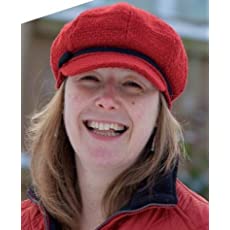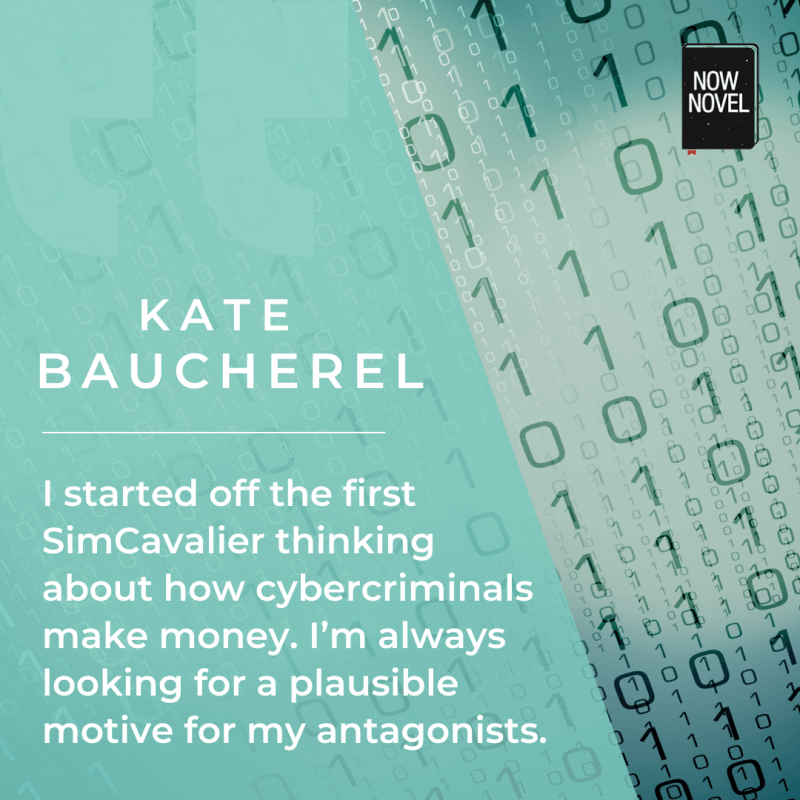Indie author and corporate blockchain educator Kate Baucherel shares insights on writing science fiction books. Learn more about writing tech fiction vs non-fiction, being accessible on technological subjects, and more.
Writing tech fiction vs non-fiction
Q: Thank you for speaking to us, Kate.
When you shared about the latest book in your SimCavalier series in our online writing groups, you said the following:
Four years ago, almost to the day, I started my fiction writing journey. I was asked to write a non-fiction book. Then it was suggested I do it as fiction, and I found this site by googling. ‘How do I write fiction?’ I characterised my MC using the questionnaire tool. Put a few paragraphs on here for review and they were well received. So here we are in 2020 and the THIRD novel in the series comes out on October 31st. There have even been some flutterings of interest in adaptation of the stories…
Firstly, congratulations! The adaptation interest must be exciting.
Could you speak a little on your experience of writing fiction versus the previous non-fiction incarnation of your SimCavalier series? For example, what was easier, and what was harder?
A: There are plenty of differences between the genres, but I think one has helped the other.
In non-fiction, you have to engage the reader in a dry subject while keeping the facts right. I was used to structuring work very clearly and logically.
In fiction, that didn’t translate as tight plotting but as a real need to be sure that the premise of the book made sense.
I started off the first SimCavalier thinking about how cybercriminals make money. I’m always looking for a plausible motive for my antagonists.
On the flip side, when I went back to writing non-fiction after two novels, I found I’d brought with me that fantastic flight of the subconscious that you get with writing fiction.
It really helped me to make the dry work way more accessible, and to explain things with engaging stories.
Oddly, in that serious book I wanted a sci-fi example for cryptocurrency use, wrote a short scene, and that spawned a whole series of short stories about Finch, a young alien on a round-the-galaxy trip. It’s a never-ending cycle.
Writing future technology books: Sci-fi fodder
Q: That it is. Speaking of cycles, the subjects of your SimCavalier series (cybercrime, blockchain) are a big part of recent tech news cycles. It’s been interesting to see the boom in this tech in recent years with soaring crypto prices.
I remember back when it was relatively new and a tech-savvy physicist friend was ‘mining’ bitcoin on his home computer (it was all Dalek to me then!).
What makes these comparatively new (or ‘future’) technologies great story subjects, in your opinion?
A: Emerging technologies are the best sci-fi fodder.
They are rounded enough to dig into the detail, they are bound up with a lot of hype and speculation about what they might be able to do, and it’s so much fun to put some of the ideas into the near future as part of normal life.
Along the way, by normalising emerging technologies in fiction, it prepares people to adopt them. I like exploring how they will all affect us.
Oddly, while blockchain and crypto may be my corporate bread and butter, we may not notice them creeping into our lives in the way that, say, self-driving cars will do.
I do have a crypto plot forming for book 4 in the series, though.
Using metaphor in technological writing
Q: As I read SimCavalier Book 1, I enjoyed the opening metaphor of the ‘worm’ that infiltrates a network, the extended crepuscular metaphor of it ‘sliding’ and landing in the ‘lush breeding grounds’ of large IT installations.
It’s fascinating how so much of our technological language (‘worms’, ‘viruses’) has such a biological emphasis, how we relate the robotic and virtual back to the biological and tangible.
What are your thoughts on this? Do you draw on these visual metaphors much in your corporate blockchain training, too?
A: Oh gosh, visual metaphors… I write fiction in a very visual way. Scenes play in my head and I literally write down what’s happening.
When I’m teaching, I use a lot of visual cues as they help people to remember the facts behind the pictures.
The one that seems to stick with everyone is a story about durian fruit on the blockchain, so I guess the idea of the smell is very evocative there!
Writing science fiction and influence
Q: Speaking of things that stick, you mention Dr Who as an early sci-fi passion in your author bio on Amazon. Which science fiction books or authors have been influential to your own writing, and in what way?
David Brin’s Earth is a fantastic near-future tale, and there’s a scene in “Glory Season” which inspired part of my approach to characters in Bitcoin Hurricane (no spoilers!).
I’ve met David a few times at conferences and he is very supportive of new writers.
Iain Banks’ work – with and without the M – and Neil Gaiman’s books and short stories inspired me to experiment and broaden my scope.
And for humour, Douglas Adams and the Hitchhiker’s Guide to Galaxy was part of my childhood, and Terry Pratchett my escape.
Balancing tech jargon with accessible storytelling
Q: Going back to the first book in your series, Bitcoin Hurricane, there was a line that echoed sentiment from your professional website where you describe how you work with corporate clients: ‘Making complex emerging technology concepts simple’.
A line that resonated with this was when Sir Simon Winchester, troubled by a ransomware attack, tells an associate named Bill to ‘make the call’. Bill responds:
‘Make the call? Bill winced at the anachronism, then nodded and pressed his thumb to a biometric scanner on his smartscreen.’
Firstly, I loved the way this suggests how our languages and their ‘fallback’ idioms cannot keep up entirely with the rapid rate of technological change in the modern world.
Secondly, as a fiction author with a background in emerging tech, how do you balance scientific or tech jargon with accessibility? Is this an active concern in the way you write? What struck me is the accessibility of your style, given the complex tech subject matter.
A: Thank you! That was the idea and it’s nice to know it hit the spot.
I love the challenge of making the stories accurate for techies while helping non-techies to keep up. The trick is that the characters lead the discussion about the tech, explaining things in dialogue or experiencing the tech directly.
Making it all very visual and relating back to current real world things helps too.
It can be tough sometimes, but I have an excellent editor, Gillie Hatton at Sixth Element Publishing, and she tells me when I’ve gone too fast and too complex.
Outlining your science fiction
Q: Returning to what you shared about your process of finding Now Novel and using the story outlining dashboard to flesh out ideas, what did you find most helpful about Now Novel’s resources?
A: The character questionnaire. It made me really think hard about my characters beyond just a name.
Having that rigour set me up incredibly well to write a character and dialogue led series, which was what I needed after writing non-fiction with no characters in it at all!
I also liked being able to drop extracts into the forums for honest feedback on style and approach. It all boosted my confidence and kept me writing until the end of the story.
Outline your own sci-fi epic
Brainstorm a great story idea, plot, characters and more in simple steps.
START
Writing sci-fi as an indie author
Q: Turning to the challenges of building audience and getting a story ‘out there’, could you speak a bit about self-publishing and how the process of publishing a book on Amazon has been for you?
Is there anything you wish you’d known when you started on this process? What advice would you give aspiring authors who are considering the indie route?
A: I’ve been down both the indie and traditional routes, as my non-fiction has been traditionally published.
Indie satisfied my impatience to publish that first novel, although I made absolutely sure that the work was professionally edited for structure and style.
In both trad and indie there is a real need to market on your own account. It’s only the very top authors who have marketing teams behind them.
I like the fact that I keep the rights to my fiction, too. That’s important to me.
My top advice is be prepared to spend as much time on marketing as on writing, and find a good editor and a good cover designer. You need the independent feedback to take your writing forward, and you need a professional cover to tell the world where your book fits.
Q: Lastly, if you could have written any piece of fiction you love from any year by any author yourself, which would it be and why?
A: That is such a hard question! I’m generally in awe of the best writers. I think I’d go back to the original Hitchhiker’s Guide. The joyous invention is part of the reason I like writing the Finch stories so much, total flights of fancy.
Thank you for sharing your publishing journey with us, Kate.
How to write future technology books: Takeaways
- Try writing both fiction and explaining tech factually.
- Find fun tech subjects that contain many ‘mights’.
- Use visuals to help people remember the facts.
- Read broadly within your subject or genre (and without).
- Be accurate for techies, but help others keep up.
- Keep characters in mind – therein lies story.
- Get a good editor who understands the topic.
- Find joy in inventing and imagining.
Read more about writing science fiction, with ideas from titans of the genre.
About Kate Baucherel

Kate Bauchrel’s first books were non-fiction, but she’s been embedded in sci-fi since childhood. Her first glimpse of the Daleks from behind the sofa pulled her into new worlds, and she never left.
In addition to her SimCavalier fiction series, she writes serious books on digital business, blockchain and cryptocurrency, which you can find on Amazon under Kate R. Baucherel.



